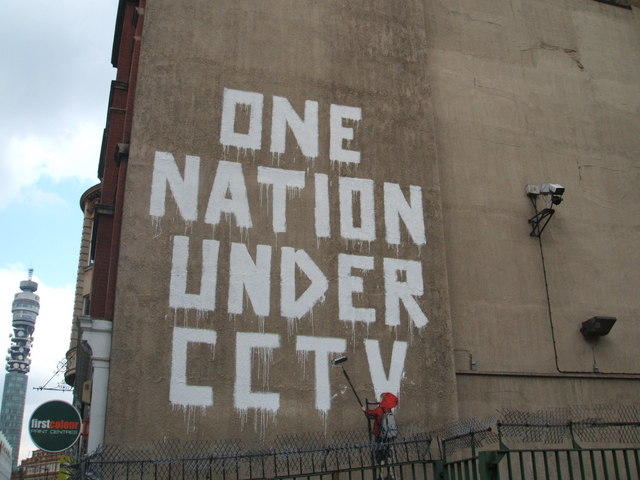Channel 4 have recently debuted the show ‘Hunted’, which tasks 14 fugitives with going on the run in the United Kingdom for 28 days. While on the run they’ll be pursued by trained professionals with means to the same information and tools as the state, although the ‘Hunters’ aren’t active police personnel. If you were asked to run, how far do you think you would make it? A day? A week? The whole month?
We’ve been amidst one of history’s largest privacy scandals in recent years, and with more and more information emerging as to how surveillance is being used to constantly monitor the general public, we sometimes have to ask why. With GCHQ and the NSA breathing down everyone’s necks, it’s not a shock that some of us struggle to find privacy in the United Kingdom. The British Security Industry Association (BSIA) estimate there are around 5.9 million CCTV cameras, with some 750,000 of those in sensitive locations such as hospitals.
The age old method police use to track people is by analyzing their behaviour and patterns – they look for repetitive, compulsive behaviour to pinpoint where their target was, where they’ll be going, and most importantly, where they are presently. While some might feel this method has become antiquated, when you combine it with modern tools such as lucrative tracking technology, you end up with an enormous net and the right idea of where to throw it.
Thanks to your social media accounts, including everything that passes through your phone, Facebook, Twitter, e-mail, YouTube accounts, and even that one forum you joined back in 2008, professionals have no shortage of information on you. It’s terrifyingly easy for them to profile you as a person, where you’ll go, what contacts you have, and any number of details that might pinpoint exactly where you might be headed. What’s more is that if you’re a wanted fugitive, they have every right to search all of that information.
Many government tools are also kept in digital form these days, and some physical tools can use this information to find out where you are in the UK. Thanks to ANPR (automatic number plate recognition) cameras on motorways can easily spot your vehicles, or vehicles of people that might be carrying you, and automatically flag them up with a geolocation to professionals. This is done by checking the license plate registrar, and then against a list of names flagged for possible association.
It’s not just your car either – your wallet is likely carrying another toe of your digital footprint. Your bank card or credit card will use a small microchip to communicate with computers whenever it’s used, including any card machines or ATMs. ATMs have built in cameras for security purposes, but what you probably weren’t aware of is that if a flagged person’s card is used in a machine with a camera, it can deliver live video feed to professionals. Yes, they can look right at you as you draw cash out of the hole in the wall.
What’s likely sitting in your other pocket is one of the biggest clues they have to locate you and monitor your information – your mobile phone. Phone service providers can help to locate your approximate location by determining which mast your phone is connected to, and which segment of the ‘signal apron’ your phone is sitting in. Think of it as one giant compass needle sticking out of the floor, ready to show your location to any professional who looks.
This is all very frightening for some, while others feel it is necessary to protect society; some people even feel that if you’ve nothing to hide you’ve nothing to fear. But when do we cross the threshold into yonder and beyond the point of no return? Have we already passed that point with the rapid influx of technological growth? What we must consider is that in a time of technological providence, we must also recognise a responsibility in its application.
Some of you may be aware of some of the changes in Microsoft’s Windows operating system, Windows 10 ships with telemetry. Microsoft patched retrospective operating systems to include software that conducts telemetry. If you’re unaware of what telemetry is, it’s essentially that profiling act professionals do to locate you and figure out patterns – looking at your social media, e-mail, and even the contents of your personal computer.
When we consider how terrifying some find the act of privacy invasion is from our own government, how can we respond to private companies behaving in this fashion? I have of course singled out Microsoft for their position as the dominant force in computer operating systems, but other companies are also deserving of scrutiny such Apple, Google, and even Amazon. This then begs the question – ‘How do I respond to half of the world spying on me?’ – Which, in an increasingly digital world, increasingly becomes the evident case.
We have already seen how concerning the behaviour of government officials can be with the Edward Snowden leaks, which if you didn’t know, are still happening. We’ve seen how ignorance of technology can impede on law, such as when the US almost passed SOPA and ACTA. Now we must protest the misuse of our information by companies, because there is something innately threatening about being tracked and having people track where you’re going. It can make you feel like you’re being hunted.
You cannot sign away your rights to well-being in the United Kingdom, meaning you can’t sign yourself into slavery, or sign your own death warrant. We as a country should begin recognising the implication of having a digital footprint and how that footprint can be used. Information, isn’t just a commodity. It’s a legacy, it’s a history, it’s your intimacy, it’s your hobbies, and your life. Ultimately, that should always be retained as your property, an intangible part of you that should not be signed away.
In April 2013, Paris Brown, a youth PCC for Kent, resigned from her position. She had posted tweets which could be considered racist and anti-gay, when she was between the ages of 14 and 16. Could you face that kind of scrutiny on a personal level based on things you said as a teenager? If you were asked to run, how far do you think you would make it?
Image: Chris Whippet





